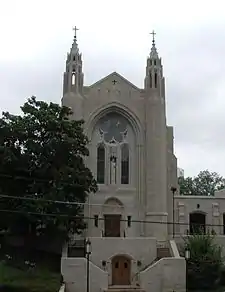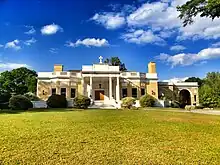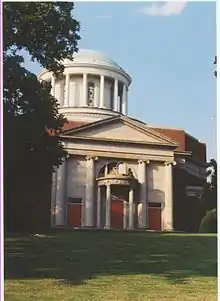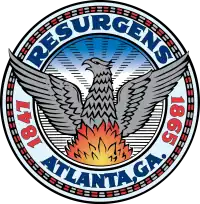Religion in Atlanta, while historically centered on Protestant Christianity, now involves many faiths as a result of the city and metro area's increasingly international population. While Protestant Christianity still maintains a strong presence in the city, in recent decades Catholic Christians have gained a strong foothold due to migration patterns. Atlanta also has a considerable number of ethnic Christian congregations, such as Korean Baptist, Methodist, and Presbyterian Churches, the Tamil Church Atlanta, Telugu Church, Hindi Church, Malayalam Church, Ethiopian, Chinese, and many more traditional ethnic religious groups. Large non-Christian faiths are present in the form of Buddhism, Judaism and Hinduism. Overall, there are over 1,000 places of worship within Atlanta.[2]
Christianity
Protestant
Protestant Christian faiths are well represented in Atlanta as the city is located in the Bible Belt,[3] the city historically being a major center for traditional Southern denominations such as the Southern Baptist Convention, the United Methodist Church, and the Presbyterian Church (USA).
African-American Baptist congregations such as Martin Luther King Jr.'s Ebenezer Baptist Church and Rev. William Holmes Borders' Wheat Street Baptist Church, were instrumental in the Civil Rights Movement in the 1950s and 1960s.
Atlanta is also the see of the Episcopal Diocese of Atlanta, which includes all of northern Georgia, much of middle Georgia and the Chattahoochee River valley of western Georgia. This diocese is headquartered at the Cathedral of St Philip in Buckhead and is led by the Right Reverend J. Neil Alexander.[4]
Atlanta serves as headquarters for several regional church bodies also. The Southeastern Synod of the Evangelical Lutheran Church in America maintains offices in downtown Atlanta; ELCA parishes are numerous throughout the metro area. There are eight United Church of Christ congregations in the Atlanta metro area, one of which, First Congregational, at the corner of Courtland Street and John Wesley Dobbs Ave. downtown, is noted as the favored church of the city's black elite including Andrew Young, for its famous minister Henry H. Proctor and for President Taft having visited in 1898.[5]
Traditional African-American denominations such as the National Baptist Convention and the African Methodist Episcopal Church are strongly represented in the area. These churches have several seminaries that form the Interdenominational Theological Center complex in the Atlanta University Center.
Protestant megachurches
Well-known Megachurches in the area include pastor Andy Stanley's North Point Community Church in Alpharetta, which Forbes magazine ranked as the third largest church in the United States,[6] the First Baptist Church of Woodstock, First Baptist Atlanta among others.[7] Primarily African American megachurches in Metro Atlanta include Creflo Dollar's World Changers Church International in College Park claiming nearly 30,000 members,[8] Eddie Long's New Birth Missionary Baptist Church in Lithonia with 25,000 members,[9] and Cameron M. Alexander's 12,000-member Antioch Baptist Church North in English Avenue, Atlanta. Atlanta ranks second in megachurches behind Houston.[9]
- Protestant churches in Atlanta
 North Avenue Presbyterian Church, on the southeast corner of North Avenue and Peachtree Street
North Avenue Presbyterian Church, on the southeast corner of North Avenue and Peachtree Street.jpg.webp)
.JPG.webp) First Church of Christ, Scientist in Midtown Atlanta
First Church of Christ, Scientist in Midtown Atlanta Inside Ebenezer Baptist Church, where Reverend Martin Luther King Jr. preached
Inside Ebenezer Baptist Church, where Reverend Martin Luther King Jr. preached
Catholic
In contrast to some other Southern cities, Atlanta's large, and rapidly growing, Roman Catholic population is a trend which didn't take shape until the 1990s. The number of Catholics grew from 30,840 members in 1960 to 292,300 members in 1998 and to 900,000 members (69 Northern Georgia Counties covering an area of 7,150,000 people) in 2010, an increase of 207 percent. However, newcomers and transplants to the Atlanta area, namely metropolitan Atlanta, do not share the same history as people who live in the city limits. Black Atlantans who were born and raised in the City of Atlanta proper have always had a small Black Catholic presence in the city dating from the early 1900s with the establishment of Black parishes such as Our Lady of Lourdes (founded in 1912) and Saint Paul of the Cross that was founded in the 1950s.[10][11][12] The increases in large numbers of Catholics in the Atlanta area that occurred in the late 20th century (and continues in the 21st century) is fueled by Catholics moving to Atlanta from other parts of the U.S. and the world, and from newcomers to the church.[12] About 14.3% of all metropolitan Atlanta residents are Catholic Christians compared to 3.1% in 1980 and 1.7% in 1960.[13] As the see of the 84 parish Archdiocese of Atlanta, Atlanta serves as the metropolitan see for the Province of Atlanta. The archdiocesan cathedral is the Cathedral of Christ the King and the current archbishop is Gregory John Hartmayer.[14][15] Also located in the metropolitan area are several Eastern Catholic parishes which fall in the jurisdiction of Eastern Catholic eparchies for the Melkite, Maronite, Syro-Malabar, and Byzantine Catholics.[note 1]
- Roman Catholic churches in Atlanta
 Roman Catholic Shrine of the Immaculate Conception (1869), oldest church in Atlanta
Roman Catholic Shrine of the Immaculate Conception (1869), oldest church in Atlanta The Roman Catholic Cathedral of Christ the King, located on Peachtree Road in Buckhead
The Roman Catholic Cathedral of Christ the King, located on Peachtree Road in Buckhead
Eastern Orthodox
The city hosts the Greek Orthodox Annunciation Cathedral, the see of the Metropolis of Atlanta and its bishop, Alexios. Other Orthodox Christian jurisdictions represented by parishes in the Atlanta area include the Antiochian Orthodox Church, the Russian Orthodox Church, the Romanian Orthodox Church, the Ukrainian Orthodox Church, the Serbian Orthodox Church and the Orthodox Church in America.
Other Religious Groups
The headquarters for The Salvation Army's United States Southern Territory is located in Atlanta.[16] The denomination has eight churches, numerous social service centers, and youth clubs located throughout the Atlanta area.
The city has a temple of the Church of Jesus Christ of Latter-day Saints located in the suburb of Sandy Springs, Georgia called the Atlanta Georgia Temple.
Other faiths
Metro Atlanta's Jewish community is estimated to include 120,000 persons in 61,300 households.[17] As of 2012, Atlanta's Metro Jewish population is 9th largest in the United States, up from 17th largest in 1996.[18] There are eruvim in the Virginia Highland and Toco Hills neighborhoods inside the Perimeter, as well as in Dunwoody, Sandy Springs and Alpharetta in the North metro area.
The BAPS Shri Swaminarayan Mandir Atlanta in adjacent Lilburn, Georgia is currently the largest Hindu temple in the world outside of India.[19] It is one of approximately 15 Hindu temples in the metro Atlanta area, along with 7 other Hindu temples in Georgia serving nearly 100,000 Hindus in Atlanta, Augusta, Macon, Perry, Savannah, Columbus, Rome/Cartersville and other remote centers.
There are an estimated 75,000 Muslims in the area and approximately 3[20] 5 mosques. The largest mosque, Al-Farooq Masjid of Atlanta, is located on 14th Street in Midtown Atlanta.[21] Muslims constitute 1.3% per cent of the population, giving Atlanta the sixth largest Muslim proportion in the country.[22]
Buddhist centers and temples in Metro Atlanta include the Atlanta Buddhist Center in Atlantic Station practicing Nichiren Buddhism and the Tibetan Buddhist Drepung Loseling Monastery in Brookhaven, associated with Emory University and where the Dalai Lama has spoken.[23]
- Places of worship of other faiths in Atlanta
 St. John's Chrysostom Melkite Church in Druid Hills, Atlanta, 2012, formerly the mansion of Asa Griggs Candler (Senior)
St. John's Chrysostom Melkite Church in Druid Hills, Atlanta, 2012, formerly the mansion of Asa Griggs Candler (Senior) BAPS Shri Swaminarayan Mandir Atlanta in the suburb of Lilburn, the largest Hindu temple outside of India
BAPS Shri Swaminarayan Mandir Atlanta in the suburb of Lilburn, the largest Hindu temple outside of India
 Al-Farooq Masjid mosque in Midtown Atlanta
Al-Farooq Masjid mosque in Midtown Atlanta
Jesus Junction
In local popular culture, Jesus Junction is the nickname for the intersection of Peachtree Street, East Wesley Road and West Wesley Road in the Buckhead area of the city, at which three churches are located. The churches at the intersection are:
- Cathedral of Christ the King (Roman Catholic), mother church of the Catholic Archdiocese of Atlanta, on the southeast corner
- Second Ponce de Leon Baptist Church, at the northeast corner
- Cathedral of St. Philip (Episcopal), just north of the intersection where Peachtree Road bends to the east
Notes
- ↑ These include St. John Chrysostom Melkite Catholic Church; St. Joseph Maronite Catholic Church in the Eparchy of Saint Maron of Brooklyn; Epiphany Byzantine Catholic Church; St. Alphonsa Syro-Malabar Catholic Church; and Holy Family Knanaya Syro-Malabar Catholic Church (Knanaya)
References
- ↑ Adults in the Atlanta metro area, Pew Research Center
- ↑ "Atlanta, Ga". Information Please Database. Pearson Education, Inc. Retrieved May 17, 2006.
- ↑ "Top 15 Reporting Religious Bodies: Atlanta, GA". Glenmary Research Center. October 24, 2002. Archived from the original on December 11, 2008. Retrieved April 29, 2008.
- ↑ "The Episcopal Church in Georgia". The Episcopal Diocese of Atlanta. Archived from the original on December 19, 2007. Retrieved December 26, 2007.
- ↑ Graham, Lawrence Otis (March 17, 2009). Our Kind of People: Inside America's Black Upper Class. Harper Collins. ISBN 9780061870811. Retrieved August 28, 2017 – via Google Books.
- ↑ "In Pictures: America's 10 Biggest Megachurches", Forbes, June 26, 2009
- ↑ "EMS Case Study First Baptist Church of Woodstock" (PDF). Dea.com. Retrieved August 28, 2017.
- ↑ "Creflo Dollar Ministerial Association". Archived from the original on December 26, 2011. Retrieved January 6, 2012.
- 1 2 Mckinley, James C.; Brown, Robbie (September 25, 2010). "Sex Scandal Threatens a Georgia Pastor's Empire". The New York Times. Retrieved August 28, 2017.
- ↑ "Office of Black Catholic Ministry :: Archdiocese of Atlanta". January 12, 2008. Archived from the original on January 12, 2008. Retrieved January 9, 2019.
- ↑ Nelson, Andrew (January 1, 2009). "Parishes Receive Data As Catholic Population Surges". The Georgia Bulletin. The Catholic Archdiocese of Atlanta. p. 10.
- 1 2 "Project aims to bring Catholics back to church | ajc.com". Archived from the original on December 12, 2010. Retrieved December 13, 2010.
- ↑ "Business to Business Magazine: Not just for Sunday anymore". Btobmagazine.com. Archived from the original on August 20, 2009. Retrieved April 5, 2010.
- ↑ "Archdiocese of Atlanta Statistics". Archatl.com. Archived from the original on September 17, 2010. Retrieved April 5, 2010.
- ↑ Nelson, Andrew (September 6, 2007). "Catholic Population Officially Leaps To 650,000". The Georgia Bulletin. Archived from the original on October 13, 2007. Retrieved December 19, 2007.
- ↑ "About The Salvation Army". The Salvation Army. Archived from the original on September 29, 2007. Retrieved September 21, 2007.
- ↑ "Jewish People Around the World". Archived from the original on May 28, 2015. Retrieved January 15, 2015.
- ↑ "Jewish Community Centennial Study 2006". Jewish Federation of Greater Atlanta. Archived from the original on August 20, 2007. Retrieved September 28, 2007.
- ↑ Goodman, Brenda (July 5, 2007). "In a Suburb of Atlanta, a Temple Stops Traffic". The New York Times. Retrieved September 10, 2009.
- ↑ "Mosques in Atlanta Georgia - Find mosques near you". Elevated Muslims. Retrieved July 28, 2020.
- ↑ "Al-Farooq Masjid of Atlanta". Archived from the original on October 3, 2008. Retrieved November 15, 2008.
- ↑ "America's Muslim Capitals". The Daily Beast. August 10, 2010. Retrieved August 28, 2017.
- ↑ "Drepung Loseling Monastery, Inc. Center for Tibetan Buddhist Studies". Drepung.org. Retrieved August 28, 2017.
External links
- Jamillah Karim, Negotiating Gender Lines: Women’s Movement across Atlanta Mosques, Southern Spaces, 31 May 2010.
- Evangelical Lutheran Church of the Redeemer historical marker
- Immaculate Conception Church historical marker
- Mt. Gilead M.E. Church historical marker
- Mt. Zion Methodist Church historical marker
- Old Mt. Zion Church historical marker
- Our Lady of Lourdes Catholic Church historical marker
- Paces Ferry United Methodist Church historical marker
- Saint Luke's Episcopal Church historical marker
- Sardis Methodist Church historical marker
- St. Philips Episcopal Church historical marker
